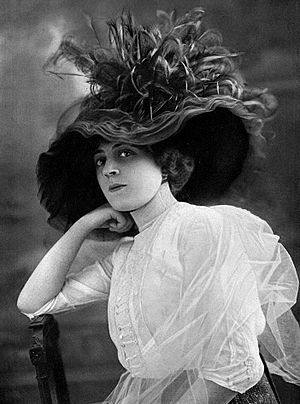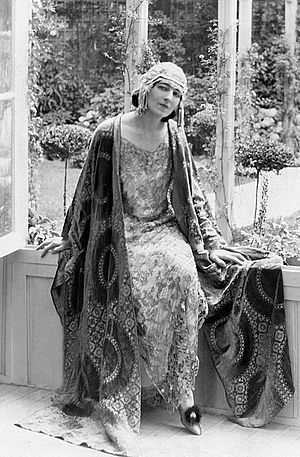Ida Rubinstein facts for kids
Quick facts for kids
Ida Rubinshtein
Ида Рубинштейн |
|
|---|---|
 |
|
| Born |
Ida Lvovna Rubinshtein (or Rubinshteyn)
5 October 1883 |
| Died | 20 September 1960 (aged 76) |
| Occupation | dancer, actress |
| Years active | 1908-1939 |
| Partner(s) | Romaine Brooks |
Ida Lvovna Rubinstein (born October 5, 1883 – died September 20, 1960) was a famous Russian ballerina and actress. She was also a very important supporter of the arts. She helped many artists and created new dance and theater shows.
Contents
Early Life and Dance Training
Ida Rubinstein was born in Kharkov, a city in the Russian Empire. She came from a very rich Jewish family. Sadly, she became an orphan when she was quite young.
Ida did not have a lot of traditional ballet training. This was unusual for Russian dancers at the time. Instead, she was taught by a famous choreographer named Mikhail Fokine. She made her first public appearance in 1908. This was a special private show of a play called Salomé.
Her Amazing Career
Ida Rubinstein soon joined the famous Ballets Russes dance company. In 1909, she danced the main role in Cléopâtre in Paris. The next year, in 1910, she played Zobéide in Scheherazade. Both of these ballets were choreographed by Fokine. Their beautiful costumes and sets were designed by Léon Bakst. In Scheherazade, her dance partner was the amazing Vaslav Nijinsky.
Scheherazade was loved for its stunning designs and costumes. The music for this ballet was written by Nikolai Rimsky-Korsakov. Today, this ballet is still performed by the Mariinsky Ballet. Ida Rubinstein left the Ballets Russes in 1911.
Ida's Own Dance Companies
After leaving Ballets Russes, Ida Rubinstein started her very own dance company. She used the money she had inherited to create many grand and beautiful shows.
In 1911, she performed in a show called Le Martyre de Saint Sebastien. The dance was by Fokine, the designs by Bakst, and the music by Claude Debussy. This show was a big success because it was very modern and stylish. However, it also caused some discussion. Some people found it controversial because a woman played the role of a male saint.
In the 1920s and 1930s, Ida acted in several plays. She also performed in Istar at the Paris Opera in 1924. From 1928 to 1929, she led her own company in Paris. Bronislava Nijinska was the choreographer for her company.
Ida Rubinstein asked Maurice Ravel to create music for her. She then performed in his famous work, Boléro, in 1928. Other new works created in 1928 included David with music by Sauguet. There was also Le Baiser de la fée with music by Igor Stravinsky and choreography by Nijinska. Her company also performed The Firebird (L'Oiseau de Feu). This ballet had music by Stravinsky and choreography by Fokine. It had been one of the most exciting shows for the Ballets Russes.
Ida's company was brought back in 1931 and 1934 with even more new shows. She closed her company in 1935. Her last performance was in the play Jeanne d'Arc au bûcher in Paris in 1939. Ida often put on free ballet shows for everyone to enjoy. She continued to dance until World War II began.
Later Life and Achievements
Ida Rubinstein started her dance training a bit later than most ballerinas. This meant she wasn't known for perfect ballet technique. But she had an amazing "stage presence." This means she could really capture an audience's attention. She was also a fantastic actress.
Ida was a very important supporter of the arts. She paid for many new works to be created. These shows often mixed dance with acting and special stage effects. In 1934, the French government gave her the Légion d'honneur. This is a very important award in France. In 1939, she received the Grand Cross of the order, which is their highest honor. In 1935, she became an honorary French citizen.
In 1940, Ida left France during World War II. She traveled to England through Algeria and Morocco. In England, she helped wounded Free French soldiers until 1944. After the war, she returned to France. She lived her final years at a place called Les Olivades in Vence. She passed away there in 1960 and is buried nearby.
Images for kids
-
Rubinstein in Scheherazade, 1910
-
Rubinstein as St. Sebastian in the play Le Martyre de saint Sébastien, 1911
-
Portrait of Ida Rubinstein, 1913 by Antonio de La Gándara.
See also
 In Spanish: Ida Rubinstein para niños
In Spanish: Ida Rubinstein para niños
 | Tommie Smith |
 | Simone Manuel |
 | Shani Davis |
 | Simone Biles |
 | Alice Coachman |








